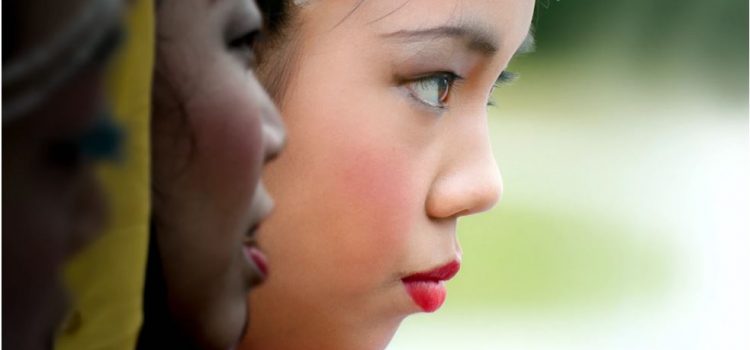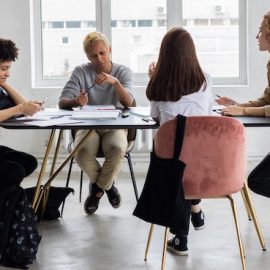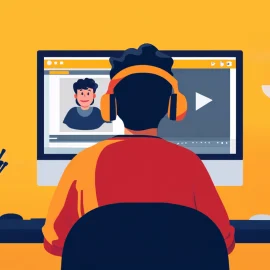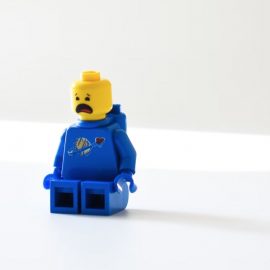

This article is an excerpt from the Shortform book guide to "The Light We Carry" by Michelle Obama. Shortform has the world's best summaries and analyses of books you should be reading.
Like this article? Sign up for a free trial here.
How does racial discrimination affect one’s mental health? What psychological problems are victims of racial discrimination likely to suffer from?
Discrimination occurs when a person is different from the majority in some way and is treated poorly because of those differences. In her book The Light We Carry, Michelle Obama writes that being discriminated against on the basis of superficial differences (e.g. race) makes people self-conscious and primes them to behave in ways that are acceptable to others.
Here’s what Michelle Obama has to say about racism and mental health.
Discrimination Makes People Self-Conscious
According to Michelle Obama, racism and mental health are directly related. She defines self-consciousness as a shift in perspective in which people focus on trying to fit in instead of behaving in a way that makes them happy and fulfilled.
For instance, Obama faced discrimination during her college years. As one of the only Black and female students at Princeton, she worried constantly about how the rest of the student body saw her, and she struggled to feel happy or fulfilled.
| Overcome Self-Consciousness Stemming From Discrimination Discrimination likely causes people to feel self-conscious due to shame. Shame erodes people’s sense of identity or, in Obama’s words, negatively impacts how they see themselves. This often occurs when people believe that something about them is inherently wrong or negative. Discrimination arguably ignites shame by treating the parts of a person’s identity that differ from the majority as unacceptable, implying these differences are wrong or negative. To overcome shame, confide in others. They’ll be able to reassure you that discrimination is not a valid source of shame and help you overcome it. For instance, Obama says she found minority students to confide in at Princeston’s multicultural center, which helped her recognize and overcome her self-consciousness. |
Obama says there are two main types of discrimination that cause this shift in perspective:
Type #1: Lack of Representation
One way discrimination causes minorities to experience self-consciousness is by underrepresenting their identities in many fields. Obama says minorities often struggle to find role models since most industries are dominated by the majority. This lack of role models makes minorities feel isolated and powerless: They have trouble believing they could complete an ambitious goal in their field because they lack examples of how to do so. This disbelief makes it harder for them to challenge themselves and nurture their personhood.
Often, Obama says, a lack of representation makes minorities either give up their goals or suppress parts of their personhood to emulate someone very different from themselves. They behave self-consciously, changing their behavior to fit others’ expectations. For example, if Emma loves science but she’s never learned about important female scientists, she might feel discouraged. She might believe that only men can be scientists. This might make Emma give up on science, or she might believe she has to act like a man to be successful. Thus, Emma becomes self-conscious, either abandoning her interest in science or suppressing her more feminine traits to fit the standards she’s been exposed to.
Type #2: Minimizing Personhood
Discrimination also causes self-consciousness when the majority fixates on minorities’ differences to the point of minimizing their personhood. They focus on how minorities differ from them and overlook those people’s talents, personalities, achievements, and the things they might have in common. Obama implies that this happens because members of the majority value their own personhood and consider their attributes part of said personhood. As such, any departure from these valued attributes is seen as negative and reducing someone’s worth.
Over time, minorities begin to internalize this method of assigning value, Obama warns. They focus on the way they and other minorities differ from the majority, and they’re more likely to value themselves and others less based on these differences.
Obama says encouraging diversity is the key to reducing this kind of discrimination. As members of the majority encounter more minorities, they’ll become more used to the differences people have and start seeing beyond those differences to the minorities’ personhood. Realizing that minorities have equal worth and personhood encourages the majority to realize their worth doesn’t depend on attributes such as ethnicity, gender, or sexuality. Thus, they’ll be less likely to devalue people who don’t share those attributes, reducing discrimination.
Turn Self-Consciousness Into Empowerment
To nurture your personhood in the face of discrimination, Obama says to refocus on doing what makes you feel happy and fulfilled. Shifting your focus empowers you to direct your own life, instead of being controlled by other people’s expectations. It also helps you become comfortable sharing your authentic self because you’re proud of who you are and your achievements.
(Shortform note: In The Four Tendencies, Gretchen Rubin says personality type may dictate how easy it is to focus on what makes you happy and fulfilled. Rubin identifies two sources of motivation: external expectations, where someone else’s desires or needs motivate you (for example, a work deadline), and internal expectations, where your desires or needs motivate you (for example, committing to daily exercise). If you’re externally motivated, you’ll struggle to focus on your own internal expectations, as Obama suggests doing. You can overcome this issue by finding an accountability partner who imposes external expectations that you’ll pursue your own goals.)
Obama offers several tips for turning self-consciousness into empowerment, which we’ve organized into three steps:
Step #1: Acceptance
The first step is accepting things you can’t change. This lets you focus on things you can control, helping you nurture your personhood and making it more likely that you’ll improve things. By contrast, focusing on things you can’t change makes you feel powerless and bitter.
For example, let’s say Tom couldn’t buy a particular house because the seller dislikes Black people. Focusing on this discrimination makes Tom feel miserable and powerless, but if he focuses on finding a non-discriminatory seller or reporting this instance of housing discrimination, he’ll feel more in control and hopeful.
(Shortform note: People who focus on things they can’t control often have one of two reactions: They waste energy trying to change things anyway, or they feel like their entire life is out of control. The former reaction leads to burnout and the latter to helplessness, and both increase cynicism and stress. If Tom tries to change the seller’s mind, he’ll be frustrated and experience more racism, leading to exhaustion and even depression. By focusing on finding a different seller or resisting the injustice of the housing discrimination he faced, he can cultivate positivity about his situation, motivating and empowering him to find a better house.)
Step #2: Gratitude
The second step of turning self-consciousness into empowerment is to focus on what you have, not what you don’t. This can include everything from objects to relationships. Obama says focusing on these positives helps you feel successful and worthwhile. Feeling successful and worthwhile helps combat the discrimination that lowered your sense of self-worth and helps nurture your personhood. For example, Tom can focus on how he feels valuable as a father and husband, rather than focusing on his lack of a house.
(Shortform note: While Obama frames gratitude as focusing on objects and relationships you have, you can arguably apply her advice to your successes, too. Research shows that focusing on your successes actually makes you more successful: It helps you keep momentum to meet future goals, increases motivation, and helps you understand your situation accurately. This boosts your self-worth, encouraging you to focus on how your life works for you, regardless of other people’s expectations. In turn, it reduces self-consciousness and increases empowerment.)
Step #3: Reframing Thoughts
Finally, Obama states that people must reframe the way they think about their and other people’s personhood: Specifically, they must combat the psychological effects of discrimination by changing their thought patterns. In other words, instead of saying “I’m different and that’s bad” or “Others are different and that’s bad,” people should say “I’m different and that’s good” or “Others are different and that’s good.” Over time, everyone’s thought patterns will become more positive, encouraging themselves and others rather than tearing them down.
(Shortform note: People can change their thought patterns because of neuroplasticity, the ability to develop new neural connections between a stimulus and reaction. In this case, you develop a new connection between the way you differ (or someone else differs) from the majority and your opinion of yourself (or them). Forming these connections requires sustained, deliberate focus: Analyze how you react when thinking of your own or someone else’s differences. Determine whether this reaction is beneficial or prejudiced. If it’s prejudiced, think about the reaction you’d like to have instead.)
Changing your thought patterns is difficult. Obama suggests exploring how your differences are also strengths. The challenges minorities face often make them adapt in ways the majority don’t. This means minorities’ perspectives—and thus their personhood—are unique and help them have innovative ideas. By identifying how their differences are also strengths, minorities can feel empowered and help solve problems.
For example, imagine a programming team is making an app that helps people with autism communicate. If one team member has autism, they can recognize that their experiences provide a valuable window into the communication needs of people with autism. Therefore, they’re well-equipped to design innovative features for the app.
| Ignore or Embrace: How to Deal With Being Different Some people believe that minorities’ differences don’t matter and that people shouldn’t focus on the ways they or others differ from the majority. This mindset can actually harm minorities: Rather than combat discrimination, it can encourage people to ignore it, allowing it to continue. In contrast, acknowledging minorities’ differences can help them. In one study, working-class, first-generation college students attended panels discussing how their backgrounds could help them persevere in stressful college situations—for example, how a strong work ethic could be beneficial. These students were later healthier and better at handling stress than those who didn’t attend the panels. This implies that accepting the way their differences affect them lets people nurture their strengths, resulting in a better quality of life. |

———End of Preview———
Like what you just read? Read the rest of the world's best book summary and analysis of Michelle Obama's "The Light We Carry" at Shortform.
Here's what you'll find in our full The Light We Carry summary:
- Michelle Obama's advice on fulfilling your potential in life
- The benefits of nurturing and sharing your unique abilities and strengths
- How to overcome the obstacles to reaching your potential and creating change






